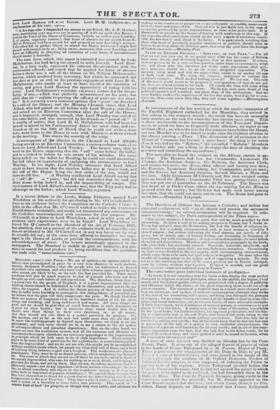MISTAKES ABOUT TUE POOR.—We are of opinion—an opinion which we
believe was promulgated in print by a very wise observer in such matters, namely, Benjamin Franklin—that the people who are habituated to depend upon their own exertions, and who have hut little reliance upon support by any other tneans, are likely to be, in the end, the best provided for. Their moral condition will also be much supetior to that of a people who have not been brought up with such habits of selfolependence. We, therefore, think that, as o general rule for the people of England, it is a great improvement that the working classes should be habituated to look to themselves, and not to the pa. riuhes, for support. And if, within the decent privacy of their own families, they do suffer some hardship to aurcomplish this independence of parochial aid, we believe that the gain will fully compensate the pain. We thank God that there are sources of happiness even in the humblest station of life far above eating and drinking, and lying well-liona...1 and warm. All these things are good, and we should be glad that all conid have them in such abundance as Is goal for their health ; but it concerns their moral health that they should owe these things to their own exertions, or, at all events, that they should not owe them to a public provision for paupers. 01, this account, and so far as the new law tends more than the old law did to came the working-people to depend upon themselves, we think it an in. provernent; and very sorry should we be to see a return to the old system of self.imptovidence and parochial dependency. But, on the other hand, we cannot see how the workhouse system, and all the nauseous and offensive cit.- !instances thereupon attendant, are necessary appendages to the improvement in principle which we look upon to be of such importance. There certaiuly ought to be some kind of provision for the unfortunate, as contradistinguished from the improvident ; and we do not see why this might not be accomplished Without establishments which, let people say what they will of them, are a kind of half-way thing between a gaol and a hospital. The workouses are placea of Punishment. They must be so to decent poverty, which misfortune 1134 brought en. The cases in which they are not so—if there be any such.-11Itig be those of the merely improvident, who care for nothing, so as meat, drink, and lodging, be provIded for them, and not by them, May we not, therefore, maintain that it I. extremely unjust--not to say impudent—of those writers who eulogiz,. the new law, to attack everybody who object to the workhouse system as if t Ley wet e either fools or fomenters of popular disturbance? We eau tell these writers, thdt they have themselves to thank for a great deal of the hitter feeling which exi•ts la opposition to the new Poor-law. They have a vityot ratify.; the case as if it were a clime or a brutality to have fallen into poverty. They speak of " a
Coarser kind of food" for paupers, as though they were cattle, and advocate the
making ot the c Iii iii or pauperism as utlemetoetable as possible, consistently with the bare sustenince of life. Now all this is justlable only in the case of P mine ism produced by gross improvidence, or some o:her grave fault. It is abominable to preach up the theory of dealing with misfortune in this way. If the ramessity of circumstances should render such a mode of treatment inevit- Ale, the less that is said about it the better. It is particularly revolting that those relui hoist if peruliarly popular sentiments in politics, should seem is forget, in writing about the destitute poor, that even the poor have the feeling', of huM111 meat times. —Morning Post.
STATE OF RE.FORM POLITIUS " RITENING OF T/IE PEAR." For all that we car. just now we, at no period since fi96 has the cause of Reform been more utterly and absilutely hopeless than at this moment. It comes, in conscipemee, to he a very serious question under these circumstances, what we. and those who like ourselves yet retain some aspirations after poli- tic .1 progwas, should do : to go on seems altogether impossible. The mariner, when wind and tile are against him, comes to an anchor till one or both shall turn. We most, we imppo•e, endeavour to imitate the marker's example. Shall we find holdiog•groned? We fear not. The rule of the mordl world aeons to be pt ogress or retrogression—if men do not get on, they are almost certain to fah back. Of course the time will come where the ueriple will start forward Duce mute. We do not, even now, doubt of the political lenovatii.n of mankind, any more than of the millennium. But we must frankly confess the experience of the lust five years, would go far to con- vince us, that, come wheu they like, they will come togetlaer.—Birminglunis Journal.


























 Previous page
Previous page